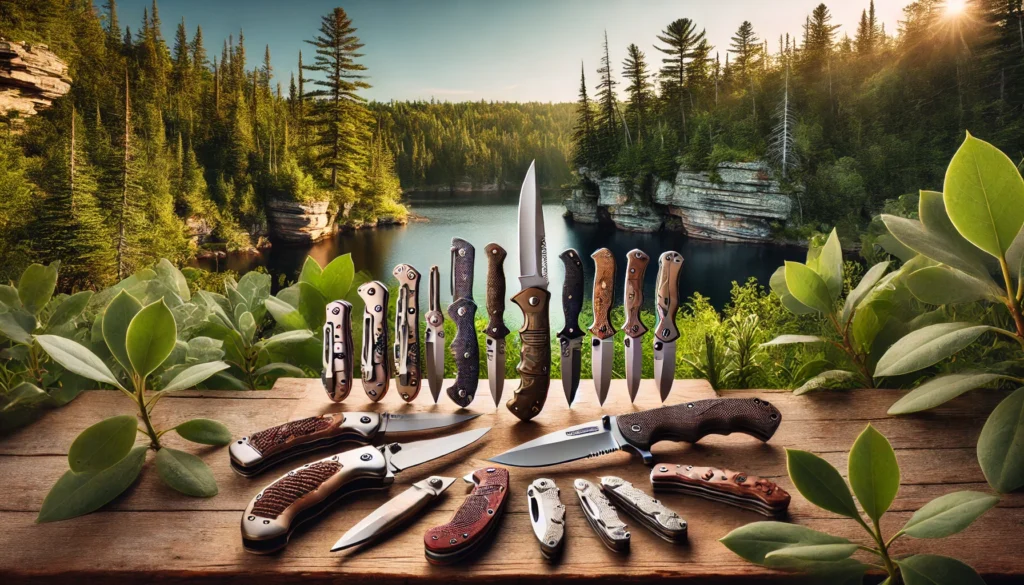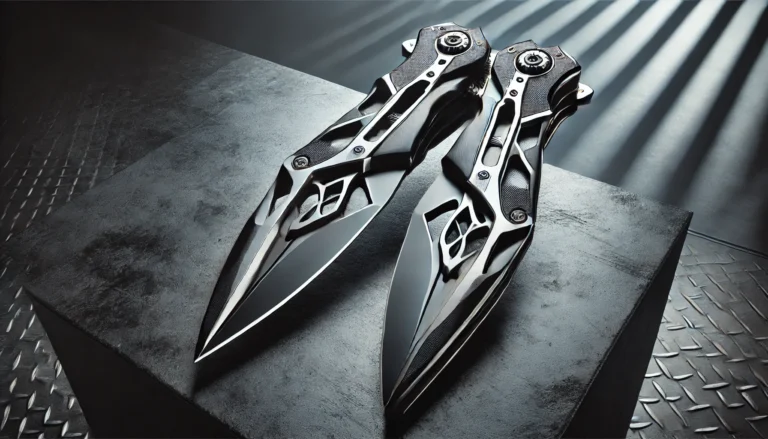
Wisconsin is a state known for its natural beauty and outdoor activities. Whether hiking in the Northwoods, fishing in one of its many lakes, or enjoying a family picnic, having a knife on hand can be beneficial. However, understanding the legalities of carrying a knife in Wisconsin is crucial to staying on the right side of the law. In this blog post, we’ll break down what size knife is legal to carry in Wisconsin, helping residents, outdoor enthusiasts, and those in legal advisories make informed decisions. By the end of this article, you’ll have all the information you need to carry a knife legally and responsibly in Wisconsin.
What size of knife is legal to carry in Wisconsin? (Short Answer)
Wisconsin has no restrictions on the size of knives you can carry. You can legally carry a small pocket knife or a large hunting knife. However, it’s important to note that knives are not permitted in certain places, like schools and government buildings. Always check for specific local rules that may apply. This ensures you stay within the law while carrying your knife.
What Are the General Knife Laws in Wisconsin?
Wisconsin has specific knife laws that every resident should be aware of. The state’s legal framework aims to ensure safety while allowing for practical use in various settings. Wisconsin law generally permits the possession and carrying of knives. However, there are limitations regarding concealed carry and the types of knives allowed.
Firstly, it’s essential to understand that knives are considered deadly weapons under Wisconsin law. This classification means that carrying a knife can subject you to specific legal scrutiny, especially if the knife is concealed. Understanding these aspects of the law is the first step toward responsible knife ownership in Wisconsin.
Legal Knife Sizes in Wisconsin
One of Wisconsin’s most common questions about knife laws is regarding the legal size of the knife you can carry. Wisconsin law does not specify a maximum blade length for knives you can carry openly. This means you can have any size of knife openly without violating state law.
However, the law has become more stringent regarding concealed carry. For instance, carrying a concealed knife with a blade longer than three inches can attract legal penalties. This regulation aims to prevent potential threats while allowing residents reasonable freedom to carry smaller knives for everyday use.
Concealed Carry of Knives
Concealed carry laws are essential for those who wish to carry a knife in a manner that is not visible to others. Wisconsin law requires that any knife with a blade over three inches be carried openly unless you have a concealed carry permit. The concealed carry permit, typically associated with firearms, also applies to knives in Wisconsin.
Obtaining a concealed carry permit involves meeting several requirements, including background checks and safety training. Thus, if you plan to carry a knife with a blade longer than three inches, getting a permit is advisable to stay within legal boundaries.
Types of Knives and Their Legal Status
Different types of knives have various legal statuses in Wisconsin. While fixed-blade and folding knives are generally permitted, specific knives, such as switchblades and ballistic knives, are prohibited. Switchblades are knives with blades that open automatically with a button or pressure applied to a handle.
Ballistic knives, which are knives with detachable blades that can be ejected, are also illegal. These restrictions minimize potential dangers associated with easily concealed and rapidly deployable knives. Understanding these classifications will help you make informed decisions about the types of knives you can legally own and carry.
Knife Laws in Different Settings
The rules for carrying knives can vary depending on where you are in Wisconsin. For instance, certain public places like schools, government buildings, and courthouses have stricter regulations. Carrying any knife in these locations can lead to severe legal consequences.
On the other hand, private properties can have their own set of rules. Property owners can prohibit knives on their premises, even if they are legally carried under state law. Knowing these different settings and their specific rules can help you avoid unintentional legal issues.
Why Size Matters in Knife Laws
Understanding why size matters in knife laws can provide better insight into the legislation. Smaller knives are generally seen as tools, while larger knives can be perceived as weapons. This distinction is crucial for law enforcement officers assessing whether a knife poses a threat.
For example, a pocket knife with a blade under three inches will likely be seen as a tool for everyday tasks. In contrast, a larger knife might be viewed more suspiciously, especially if concealed. Knowing this can help you choose the right knife while remaining within legal limits.
The Role of Local Ordinances
While state laws provide a broad framework, local ordinances can add another layer of regulation. Cities and counties in Wisconsin may have their own rules regarding knife carry. These local laws can sometimes be more restrictive than state laws, so it’s essential to be aware of the regulations in your area.
For example, some cities may have ordinances prohibiting the carrying of knives in public parks or during public events. Carrying a knife made from eco-friendly materials can help you stay compliant with local laws while ensuring long-term durability and sustainability.
How to Stay Compliant with Knife Laws
Staying compliant with knife laws involves more than just knowing the regulations; it also requires practical steps. Always carry your knife openly if it exceeds the legal size for concealed carry. If you must take a larger knife concealed, ensure you have the appropriate permit.
Additionally, regularly check for updates to both state and local laws. Legislation can change, and staying informed will help you remain compliant. Joining local outdoor or knife enthusiast groups can also be an excellent way to stay updated on the latest eco-friendly materials and durable practices.
Practical Tips for Knife Owners
Being a responsible knife owner goes beyond legal compliance and involves safe and practical use. Always use your knife for its intended purpose and handle it with care. Regularly maintain your knife to ensure it remains in good working condition.
Use a sheath or case to protect the blade and yourself when carrying a knife. If you’re new to owning a knife, consider taking a safety course to learn the proper handling techniques. These practical tips will help you use your knife safely and effectively.
Ethical Considerations in Knife Ownership
Ethical considerations play a significant role in responsible knife ownership. Using a knife in a threatening or aggressive manner is not only illegal but also unethical. Respect the power of the tool you possess and use it responsibly.
Additionally, consider the source of your knife. Ethically sourced and manufactured knives contribute to better industry practices and environmental sustainability. Being an ethical knife owner is about making choices that benefit you and the broader community.
Conclusion:
Understanding the size limits and types of knives you can carry in Wisconsin is crucial for staying within the law. Smaller knives with blades under three inches can usually be taken without issue. However, larger knives often require a concealed carry permit. Always check both state laws and local ordinances to ensure you are compliant. By following these guidelines, you can responsibly carry a knife in Wisconsin.
FAQs
In Wisconsin, you can generally carry any size knife openly. There is no specific size restriction for carrying a knife openly in public.
In Wisconsin, a permit is required to carry a concealed knife if the blade exceeds three inches. Without the license, a larger knife hidden can result in legal issues.
Yes, certain places, such as schools, government buildings, and courthouses, have stricter rules against carrying knives of any size. Always check the rules for these locations before carrying a knife.
Yes, Wisconsin cities and counties may have rules about carrying knives. Local ordinances might be stricter than state laws, so check the regulations in your specific area to stay compliant.
To stay updated on knife laws, regularly check state and local government websites for any changes in legislation. Joining local knife or outdoor groups can also help you stay informed about new rules and best practices.






